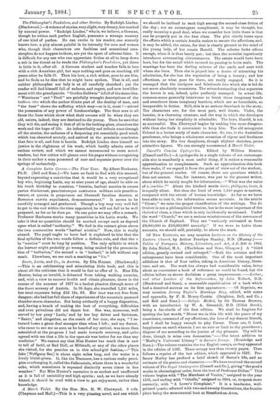we should be inclined to rank high among the second-class
fiction of the day ; not an extravagant compliment, it may be thought, but really meaning a good deal, when we consider how little there is that can be properly put in the first class. The plot chiefly tarns upon the efforts which a certain Amelia makes to secure the affections, and, it may be added, the estate, for that is clearly present to the mind of the young lady, of her cousin Harold. The scheme looks odious enough, when it is thus barely put ; but then the novelist ingeniously introduces extenuating circumstances. The estate would have been hers, but for the entail which secured its passing to heirs male. The marriage has been the darling scheme of the uncle and aunt with whom she lives. Then she is piqued into a desire of attracting his admiration, for she has the reputation of being a beauty ; and her affections, or what pass for them, are really engaged. So it is managed that the intrigues and falsehoods into which she is led do not-seem absolutely monstrous. The misunderstanding that separates the lovers is not, indeed, quite perfectly managed. In actual life, common-sense generally intervenes to break these imaginary bonds and overthrow these imaginary barriers, which are so formidable, so insuperable in fiction. Still, this is no serious drawback to the story. The characters are, for the most part, well drawn. Violet, the heroine, is a charming creature, and the way in which she developer without losing her simplicity is admirable. The hero, Harold, is not so successful. Mrs. Chetwynd begins by making him more disagree- able than she finds it convenient to keep him. The old misogynist Colonel is a better study of male character. So, too, Is the Australian gentleman, who brings a wholesome sensation of vigour and freshness into the story. His five daughters, though slighter sketches, prove attractive figures. We can strongly recommend A March Violet.






































 Previous page
Previous page